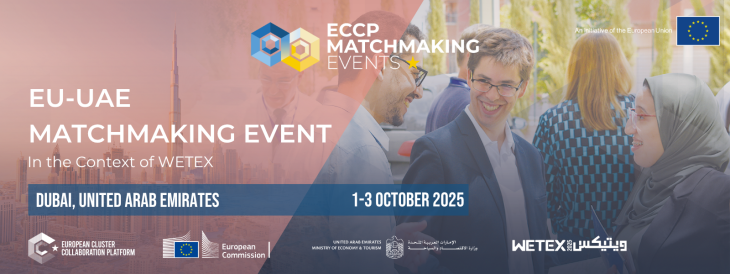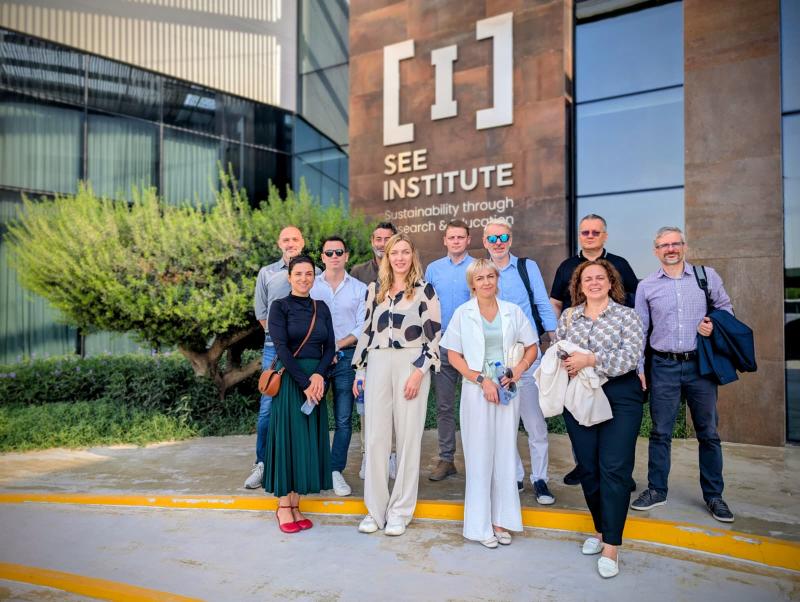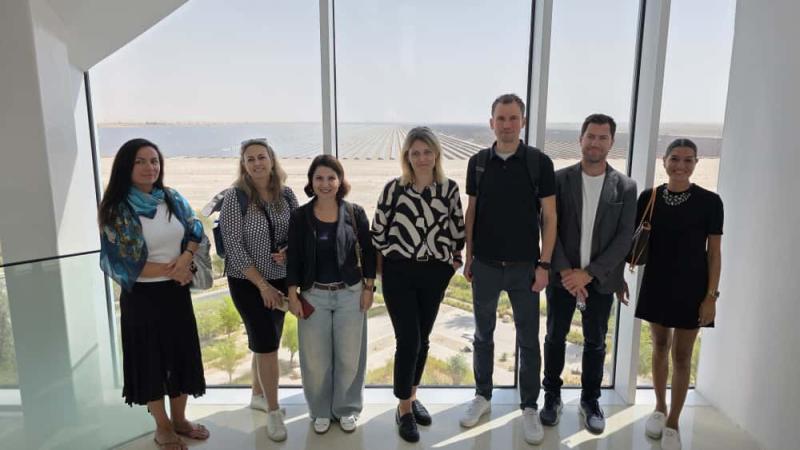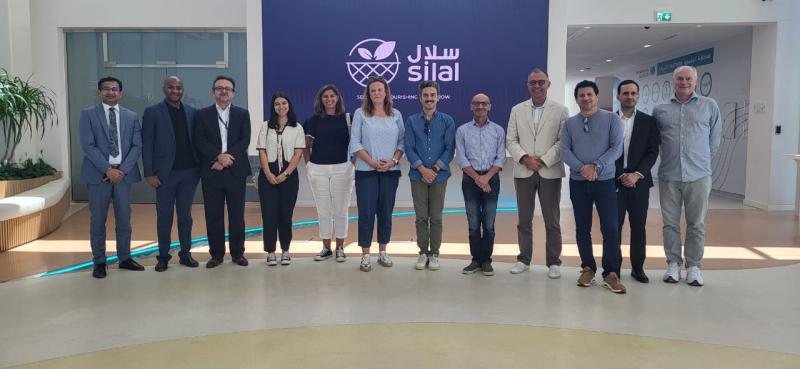Bridges of Innovation at the EU-UAE Matchmaking Event: European and Emirati Clusters and Businesses Connect in Dubai
At the heart of Dubai’s Water, Energy, Technology and Environment Exhibition (WETEX) 2025, European clusters and Emirati innovators came together to turn shared ambitions into real partnerships. The EU–UAE Matchmaking Event held from 1-3 October 2025 marked the first-ever ECCP gathering in the Gulf region, a milestone underscoring how cooperation, innovation, and scale are at the core of shaping a sustainable future between Europe and the United Arab Emirates (UAE).
Bridging Two Innovation Landscapes
During the three-day mission, clusters, SMEs, business support organisations, and UAE government representatives met to exchange ideas, explore synergies, and chart new avenues for collaboration. The event, organised by the European Cluster Collaboration Platform (ECCP) of the European Commission, with support from the UAE Ministries of Economy and Tourism, Energy and Infrastructure, and Foreign Trade, was hosted in parallel with WETEX, one of the largest sustainability exhibitions in the region, welcoming over 2,800 exhibitors from 65 countries and more than 50,000 visitors.
Delegates pitched their innovation to WETEX visitors, but a shared message stood out: clusters achieve more when they work together. As Irena Łobocka, CEO, Sustainable Infrastructure Cluster in Kraków (Poland), reminded the audience, quoting a proverb: “If you want to go fast, go alone; if you want to go far, go together.”
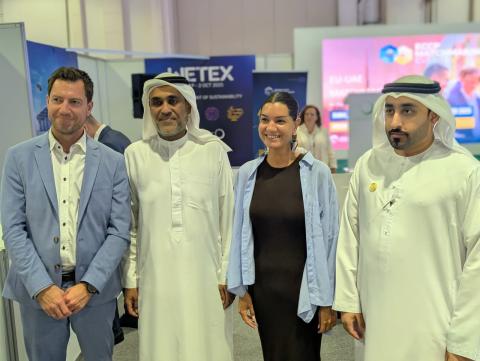
You can download all presentations from the pitching session:
Automotive Cluster Bulgaria — Lyubomir Stanislavov (Bulgaria)
Decartes Développement et Innovation — Jean-Christophe de Tauzia (France)
- ENSİA – Energy Industrialists and Business Association — Hazal Coşkun (Türkiye)
Photovoltaic Industrial Technology Cluster - FETEK — Skirmantė Baležentienė (Lithuania)
Silesia Automotive & Advanced Manufacturing Cluster — Łukasz Górecki (Poland)
Forward-Looking Messages from EU and UAE Leaders
The matchmaking event opened with a message of ambition and partnership. H.E. Lucie Berger, EU Ambassador to the UAE, highlighted the momentum created by the launch of the EU–UAE Free Trade Agreement negotiations earlier this year as “a ground-breaking step, with both sides aiming to conclude a comprehensive agreement that will significantly benefit our businesses and investors.” She welcomed the event as “another opportunity to connect European and Emirati companies and translate this ambition into concrete partnerships.”
Mariella Masselink, Head of Unit at DG Grow, European Commission, reaffirmed in her video message the EU’s commitment to collaboration through clusters, stressing that they are “agents of change that can drive the transition on the ground.” She reminded participants of the EU’s strategic framework, the Competitiveness Compass, which focuses, among other priorities, on industrial innovation and economic security.
H.E. Dr. Maria Hanif Al Qassim, Assistant Undersecretary for Economic Policies and Studies at the Ministry of Economy and Tourism, highlighted the complementarity between Europe’s cluster experience and the UAE’s forward-looking economic vision: “As the UAE advances its ambitious plan to build dynamic economic clusters across priority sectors, we see European clusters and companies as key partners in this journey. Europe’s experience in building and internationalising clusters offers valuable lessons, while the UAE provides a dynamic, future-oriented environment for collaboration.”
Closing the opening ceremony, Martina Bacova, Project Adviser at European Innovation Council and SMEs Executive Agency (EISMEA) summed up the spirit of the event, saying, “This is a first step, but definitely not the last, today’s connections open new opportunities for EU–UAE cooperation.”
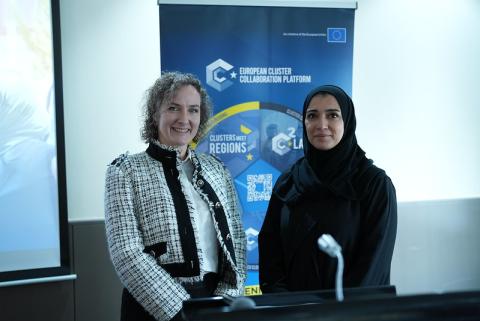
The UAE’s Vision for Global Partnerships
Fatima Ghanem Alhajri, Director of the Investment & Talent Attraction Department at the Ministry of Foreign Trade, opened the ‘Doing Business in the UAE – Opportunities, Frameworks, and Partnerships’ session with an overview of the newly launched UAE National Clusters Strategy. The framework aims to accelerate diversification and competitiveness by developing innovation-driven, globally competitive clusters across key sectors. Led by the Ministry of Economy, with implementation by federal and local entities, it establishes a unified yet flexible model for cluster growth in areas such as food, space, finance, and tourism, reflecting the UAE’s vision for sustainable, innovation-led development through public–private collaboration.
H.E. Dr. Maria Hanif Al Qassim, Assistant Undersecretary at the Ministry of Economy and Tourism, highlighted the UAE’s role as a global trade hub, with non-oil trade with the EU reaching USD 66.8 billion in 2024. Under its 2031 strategy, the UAE aims to double its economy to AED 3 trillion, focusing on sectors like manufacturing, renewables, ICT, logistics, and finance. With over 40 free trade zones and world-class infrastructure, the UAE positions itself as a gateway between Europe, Asia, and Africa.
Cluster Development Journeys: Connecting European and UAE Experiences
The session was followed by presentations from European cluster managers and experts who shared how clusters turn policy into practice, showcasing governance models, collaboration approaches, and lessons learned. Their experiences offered practical insights for the UAE’s emerging cluster landscape, illustrating how coordinated ecosystems can drive competitiveness and innovation.
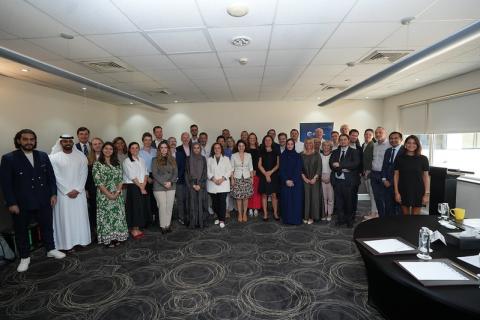
From Italy, Giovanni Scaramuzzo of DARe Puglia/Bonassisa Lab illustrated how cooperation between academia, SMEs, and institutions has shaped a model of regional innovation in southern Italy. By linking agricultural excellence with digital transformation, DARe demonstrates how adaptable ecosystems can evolve to meet global challenges.
Felix Arion of Romania’s AgroTransilvania Cluster described how his network has become an engine of agri-food innovation and smart specialisation. Integrating research, business, and local authorities, AgroTransilvania strengthens value chains, advances circular-economy principles, and builds international competitiveness through EU-funded projects.
Representing Poland, Irena Łobocka from the Sustainable Infrastructure Cluster drew on more than a decade of experience developing her country’s sustainable construction and smart-city ecosystem. She stressed that successful clusters act as bridges between industry, research, and policy, reminding participants that success is built on trust, long-term commitment, and, above all, cooperation.
From Lithuania, Skirmantė Baležentienė of the Photovoltaic Industrial Technology Cluster (FETEK) presented a story of transformation: how Lithuania grew from a small photovoltaic R&D hub in 2008 into a European leader in solar innovation. FETEK’s success, she explained, lies in its deep-tech focus – integrating AI, energy storage, and CO₂ reuse systems, which is underpinned by strong collaboration between academia, industry, and government.
To complement these insights, Jan-Philipp Kramer from Prognos AG/ECCP Data & Policy Team (Germany) presented an analytical overview of the 1,640 clusters registered on the European Cluster Collaboration Platform (ECCP), representing more than 170,000 organisations and 140,000 SMEs across Europe. His data showed how clusters strengthen competitiveness, drive innovation, and serve as connectors that enable ecosystems to scale across borders and translate industrial policy into real cooperation. He underlined that the UAE’s diversification strategy aligns closely with Europe’s green and digital transition priorities, identifying renewable energy, advanced manufacturing, and digital industries as key areas for joint development.
Planting the Seeds of Long-Term Collaboration
At the heart of the programme was the C2C and C2B matchmaking session, which generated 141 meetings between 36 organisations. The European delegation consisted of clusters and SMEs from 15 European countries — Austria, Bulgaria, Croatia, France, Germany, Hungary, Italy, Latvia, Lithuania, the Netherlands, Norway, Poland, Portugal, Romania, Spain - as well as Turkey, who met with 16 representatives from 10 Emirati organisations, including the country’s first agri-food cluster, along with business support organisations and ministry representatives.
Representing this pioneering initiative, Abdul Vaheed, Cluster Manager of the UAE Food Cluster, noted that “since the cluster strategy was announced by the Cabinet and the Ministry of Economy and Tourism, this is our first engagement — and it’s great exposure for us to meet so many clusters from Europe. The industry and food sectors here are already mature, but what we’re bringing to the table is cluster thinking and a cluster mindset, and this is what will accelerate the economy.”
Exploring Innovation in the Desert
The programme also featured site visits showcasing how the UAE is transforming environmental challenges into innovation opportunities. Delegates visited Silal’s Innovation Oasis, where advanced greenhouses and precision farming techniques tackle heat and water scarcity; The Sustainable City, a model for low-carbon urban living; and DEWA’s Sustainability and Innovation Centre at the Mohammed bin Rashid Al Maktoum Solar Park, a testament to the UAE’s commitment to large-scale renewable energy and research.
Go Big, Go Together
Witnessing these large-scale, integrated projects impressed many participants with the UAE’s financial and technological strength — and the scale of thinking required to succeed there.
Felix Arion of AgroTransilvania Cluster (Romania) observed: “What I’ve seen here is that you have to think much bigger than in Europe. If you are used to working small-scale, you’ll be outpaced. They are open here, but success needs a bigger force — and if we work together as clusters, we’ll be more successful.”
Skirmantė Baležentienė from FETEK (Lithuania) echoed this view: “We have good technologies, but to scale, we must go big — and we must go together. In Europe, we think in millions; here they start at hundreds of millions. Our sector lacks that ambition. We need to combine our strengths across Europe and bring complete, integrated value chains — that’s when we become interesting here.”
Shared Vision for the Future
Across every discussion and encounter, one theme stood out: Europe and the UAE share a vision of sustainable, innovation-led growth. The EU-UAE matchmaking event demonstrated that clusters can act as powerful enablers of international cooperation — translating strategic dialogue into real partnerships. As the first ECCP matchmaking in the Gulf, it laid the foundation for lasting collaboration between two regions committed to green, digital, and resilient economies.
Participants highlighted the need for unique concepts and long-term commitment to build relationships. The consensus was that collaboration should be sector-specific and involve European partnerships to effectively engage with the UAE market. They agreed that to succeed, clusters themselves must “think big,” align with the UAE’s Vision 2031, and bring complete, scalable solutions tailored to local needs.
In a country built on vision, Europe and the Emirates discovered that they share more than markets; they share a belief that progress comes through partnership. The desert, once seen as barren ground, proved fertile soil for ideas — and from those ideas, new bridges of innovation have already begun to rise.
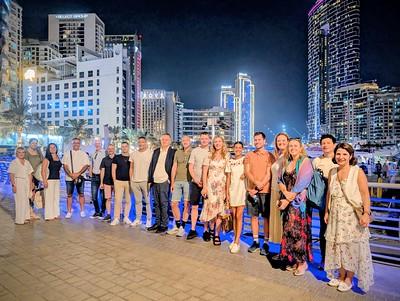
🌐 Discover more ECCP Matchmaking Events
Watch the event summary:
